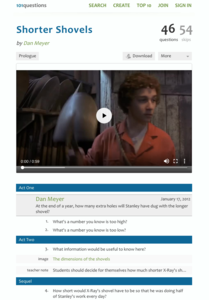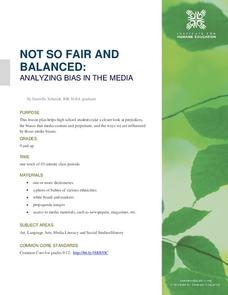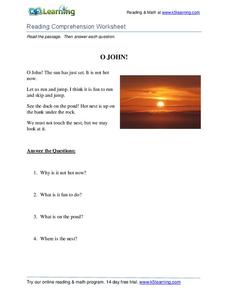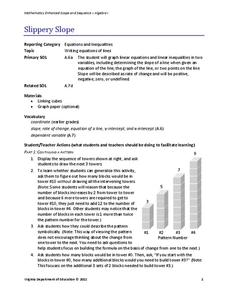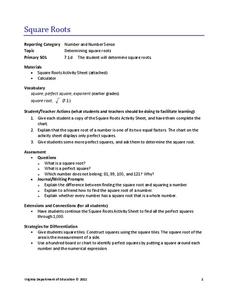PB Works
Film Viewing Guide for the movie “Glory” (1998)
Check out this simple, ready-to-use learning exercise that your young historians can complete as they watch the motion picture Glory. It begins with a very brief list of characters to track, followed by seven short-answer questions...
University of Texas
What Are Calories?
What are calories, and how do calorie needs differ from person to person? Here is a worksheet that briefly explains how calories measure the energy supplied by food, as well as suggests the amount of food an individual should eat per day.
School Specialty
The Tortoise and the Hare - Drawing Conclusions/Predictions Outcomes
Does the fastest one always win the race? Look deeper into The Tortoise and the Hare with a set of discussion questions for before, during, and after reading the story.
Colorado State University
Can Gravity Push Something Up?
How does a hot air balloon fly? An experimental lesson has scholars build a balloon from a garbage bag and monitor the movement of air. As the temperature of the air in the balloon increases, gravity moves the denser cool air down,...
Classics for Kids
Hurry Up – Slow Down
Is your music appreciation class feeling a bit adagio this afternoon? Pick up the pace and get them feeling andante with a straightforward music theory activity. After defining several terms for musical dynamics and musical...
Yummy Math
Penny Wars
As the saying goes, a penny saved is a penny earned. Young scholars use a penny activity to earn their way to an understanding of volume. Given three different-sized cylindrical containers, individuals make calculations to determine the...
101 Questions
Shorter Shovels
Learners won't have to dig themselves out of a hole thanks to an insightful video. Using the movie Holes as inspiration, individuals must determine the difference in the number of holes dug when digging with a shorter shovel. Because the...
Smithsonian Institution
Who Am I?: A History Mystery
Who Am I? Scholars go online to gather clues and evidence to uncover just who was involved in the American Civil War. They use hands-on Internet activities to come to an understanding of the roles soldiers and civilians played in the...
Institute for Humane Education
Not So Fair and Balanced: Analyzing Bias in the Media
Life is not always fair. Who's heard that before? This same concept moves to a larger scale using prejudice and bias. Pupils discuss where prejudice attitudes derive and how they develop throughout life. Reading comprehension...
Judicial Learning Center
The Appeal Process
Why doesn't the Supreme Court hear testimony from witnesses? How do they complete an entire proceeding in less than two hours? A helpful lesson guides scholars of criminology through these and other questions by explaining how appeals...
Polar Trec
Foraging for Fish in a Melting Arctic
How much do you know about the black guillemot of the Arctic region? With great background information, images, and a quick discussion, the class will learn all about the plight of the foraging seabird as they play a fun game. First,...
BioEd Online
Spiders in Space
Does a spider spin its web differently in space? What other ways might microgravity affect an arachnid? Pick a topic to research, plan an investigation, and follow astronauts on the International Space Station as they perform some of the...
K5 Learning
The Eagle and the Fox
How does a fox outsmart an eagle and all the creatures of the sea? Read about a tricky fox with a short story, followed by four comprehension questions about the plot and another possible endings.
American Chemical Society
Joseph Priestley, Discoverer of Oxygen
Do you want to hear a joke about nitrogen and oxygen? NO. We all know there is oxygen in the air and that plants produce oxygen, but how was it discovered? Scholars read a handout, answer questions, and analyze material in the...
Balanced Assessment
Stick Patterns
Sticks and stones may break my bones, but these sticks will make me smarter. Pupils examine arrays of sticks to determine the next array in a pattern. They use the number of sticks added to each previous array to determine a recursive...
NOAA
Animals of the Fire Ice
When the sun's rays can't reach the producers in a food web, where does all the energy come from? Extreme environments call for extreme food sources. Young scientists investigate creatures that appear to get their energy from methane...
K5 Learning
O John!
As the sun sets, what does the narrator see? After reading brief passage, first graders answer four comprehension questions about what they read.
CK-12 Foundation
Energy Conservation Simulation
Does the amount of a roller coaster's energy change as it goes along the track? Scholars investigate when a roller coaster has potential and kinetic energy. They observe the changes as it goes up the initial hill follows it throughout...
National Endowment for the Humanities
The Preamble to the Constitution: A Close Reading Lesson
"We the people of the United States, in order to form a more perfect union..." These familiar lines begin the Preamble to the Constitution, but do learners know what they mean? A close reading exercise takes a look at the language of the...
Virginia Department of Education
Factoring for Zeros
Relate factors to zeros and x-intercepts. Scholars first graph quadratics in both standard and factored forms to see that they are the same. They go on to use the graphs to see the relationship between factors and x-intercepts.
Virginia Department of Education
Slippery Slope
Explore slope using geometric patterns. Young mathematicians investigate towers built from cubes to develop a linear pattern. They move the data to a coordinate plane to connect the pattern to slopes.
Virginia Department of Education
Square Roots
Square away any doubts about using a new resource. Pupils learn about squares and square roots in the mini-lesson. They complete a worksheet identifying roots of perfect squares up to 400.
Virginia Department of Education
Modeling Multiplication of Fractions
Multiply your understanding of multiplying fractions. A short lesson teaches pupils how to multiply fractions. By using fraction models, they get a better understanding of the concept.
Curated OER
Internet Weather Scavenger Hunt
For this internet usage worksheet, students search online to find the answers to 10 weather questions. This worksheet does not direct students to any particular website for this information.






